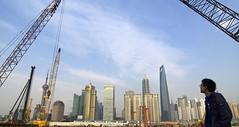
China has become an economic powerhouse in Asia and throughout the world. The nation's stimulus package far outstrips the US. The socialist nation places people before banks.
Originally uploaded by Pan-African News Wire File Photos
ASIA-Pacific leaders have called for regional-wide free trade and other measures to reduce dependence on the United States (U.S.) and big Western markets as Asia leads the way out of the global economic downturn.
Japanese Prime Minister Yukio Hatoyama, according to Reuters yesterday, urged Asian leaders to keep up fiscal and monetary stimulus measures even as their economies show mounting signs of recovery, saying there was "no room for complacency" and that the job market was still "dire."
"At the moment, the global economy is showing signs of recovery, mainly in Asia," Hatoyama told the closed-door East Asia Summit of 16 Asia-Pacific leaders in the Thai town of Hua Hin, according to Foreign Ministry spokesman, Kazuo Kodama.
At the meetings, held under tight security, Hatoyama found tentative support from his Asian counterparts for a proposed regional community inspired by the European Union that would account for nearly a quarter of global economic output.
"I think my long-term vision of forming an East Asia Community was largely welcomed by participants," Hatoyama said.
The bloc, however, would take more than 10 years to create and may include some sort of regional currency, he added.
Thai Prime Minister Abhisit Vejjajiva, host of the meetings, said Asia clearly needed a new growth model leaning less on big Western trading partners and more on Asia-wide trade pacts. The global financial crisis, he said, bore this out.
"The old growth model, where simply put we have to rely on consumption in the West for goods and services produced here, we feel will no longer serve us as we move to the future," Abhisit told a news conference.
Asia's leaders also called on North Korea to end its nuclear arms programme and resume stalled six-nation talks. It also urged military-ruled Myanmar to ensure its elections next year were free and fair.
And they mostly agreed it was too early to end government spending and other measures designed to get Asia back on its feet, said Indian Prime Minister Manmohan Singh, who is at the helm of Asia's third biggest economy.
"The world's eyes are on Asia as the region which can lead the global economic revival," he said.
But there were signs that integrating Asia's wildly divergent countries - from the economic powerhouses of Japan and China to the hermit state of Myanmar and impoverished regions of Southeast Asia - is easier said than done.
Thailand, the world's biggest rice exporter, and the Philippines failed to reach agreement on the weekend in a row over import tariffs that could derail a trade pact at the heart of Southeast's bid to build an economic community by 2015.
A free-trade pact in Southeast Asia, a region of 570 million people, calls for Philippine rice import tariffs to be cut to 20 per cent from 40 per cent by January 1, and then be progressively cut further. But Manila says the tariffs should stay at 35 per cent.
"The Philippines is not ready to change its figure as far as tariff rates are concerned because it has to protect its own farmers," said Philippine Trade Secretary, Peter Favila. There were other ways to propel the region's budding economic recovery, said Asian Development Bank President Haruhiko Kuroda, urging Asian leaders to keep stimulating domestic demand along with regional demand to become less dependant on the U.S. market.
"A re-balancing of the sources of growth in Asia is a very important challenge," he was quoted by a Japanese official as saying.
Japan's idea for an East Asian Community would encompass Japan, China, South Korea, India, Australia and New Zealand, along with the 10-member Association of South-East Asian Nations (ASEAN). Leaders from all those states joined yesterday's talks.
Australian Prime Minister Kevin Rudd pushed another idea for a new, separate forum of Asia-Pacific nations to respond to regional crises - from natural disasters to security scares and economic meltdowns. His idea includes the United States.
The meetings followed an ASEAN summit that got off to a rancorous start on Friday, overshadowed by a diplomatic spat between Thailand and neighbor Cambodia, and marred by the absence of three leaders at the opening ceremony.
Host Thailand deployed about 18,000 security personnel backed by military gunships, determined to avoid a rerun of mishaps at past summits.
The summit was initially scheduled for December last year but was postponed when anti-government protesters shut down Bangkok's airports. It was moved to the Thai resort area of Pattaya in April but was subsequently aborted when a rival protest group broke through police and army lines and stormed the summit venue.
No comments:
Post a Comment